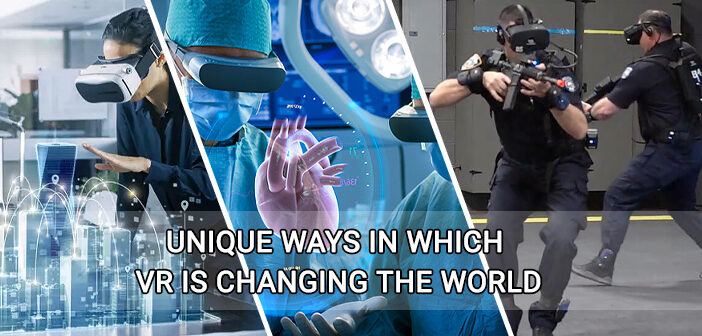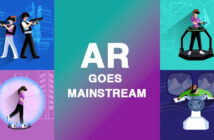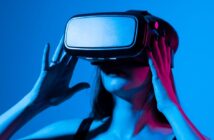The last industrial revolution was brought on by the advent of the internet. Even as we acclimatize to irrevocable changes in our way of life, the next revolution is already knocking on our doors. Virtual Reality (VR) technology promises to be as paradigm-shifting a phenomenon as the internet has been.
With multiple industries adopting VR tech in different aspects of their operations, more niche and unique user cases are emerging every month. Multiple factors are responsible for this, the most important being the increasing feasibility and availability of VR components. These up-and-coming ways of applying immersive virtual technology are a window into what our daily lives may become very soon.
The following VR use cases that emerged in 2021 are our favourites:
VR/AR Integration in Veteran Homes
US Veterans Health Administration has launched its very own XR Network initiative, which plans to use VR technology for a dual purpose: one, for better medical examinations of patients, and two, for relieving pain, stress, restlessness and boredom. After 300 sessions conducted in the program’s first run, the jury is still out on the medical assessment front. On the psychological front, however, the program has yielded significant results – with a 67% decrease in restlessness among patients.
This program turns the issue of lacking healthcare services for the older generation into a VR use case pertaining to sensory stimulation. Old age reduces our mobility, and many war veterans further suffer from partial or total physical disability. This greatly diminishes their recreational options, which in turn affects their mental health.
By using VR headsets for a high degree of visual and mental engagement, the program is focusing on providing a better quality of life for its beneficiaries. The program is now set for an 11-location launch.
Gamified Healthcare Awareness and Deliverance
The University of Copenhagen recently conducted an experiment in which participants were asked to play a VR game in which their objective was to avoid being infected in a public place. The findings showed that there was higher ‘vaccine tension’ among participants after playing the game, which correlated with a more positive attitude towards getting vaccinated.
This use case is a breakthrough in how medical information and awareness campaigns can be made more effective. Scepticism is on the rise the world over; 25% of the adults in a European polling sample declared that they will not opt for a Covid-19 vaccine, highlighting the need for more engaging as well as educational healthcare initiatives.
VR tech enhances the range of input a person can key into during a simulation, which makes public health announcements conveyed using VR efficient and memorable. The Denmark pilot can also help engage younger citizens through gamified experiences, broadening the audience of their messaging.
Furniture Retail through VR
Since 2016, eBay Australia and Myers have been working together to introduce Virtual Reality retail experiences. Recently, they have introduced ‘shopticals’, a pair of VR goggles that transports users to a virtual furniture store. When entering the VR store, users are asked about their preferences, and using this data the virtual furniture store is customized for them instantaneously. Using eye movement detection, the ‘shopticals’ determine a customer’s gaze and provide more information about the product.
The issue with online shopping has always been regarding products that rely on personal taste, such as clothing, furniture and decor. Using VR in retail can effectively bring the store inside one’s home, enabling users to experience the products beforehand and make easier decisions. Improved ease of shopping brings in more customers, making it easier for businesses to thrive.
Immersive 3D art and design
With the rising hype around digital art catalysed even further by recent NFT art sales, there is an increasing demand for 3D virtual design software. In response, Masterpiece Studios have released their Studio Pro version, an immersive VR software for artists who wish to design digital art in immersive 3D.
This software offers a gamut of features that makes designing 3D pieces easy and intuitive, rather than the highly specialised skill it has always been. It essentially boils the technical task of digital modelling to an artistic endeavour akin to sculpting. Masterpiece Studios have made it possible for artists to upgrade their skills for a rapidly changing media and entertainment landscape. In a VR-powered future, artists and designers are bound to find even more uses for Masterpiece’s suite of services.
Online meetings and Virtual Conferencing
Work-from-home is here to stay. However, meetings and conferences vital to an organisation tend to lose efficacy in remote working models, due to the limitations of commonly used online conferencing applications. NextMeet is device-agnostic offering that helps its users convene inside a 3D virtual ecosystem.
Doing away with flat screen feeds, users of NextMeet can interact with each other and their virtual environment – which mimics a seminar hall, a physical expo space, and art gallery – using 3D avatars. Users can also enjoy greater immersion through realistic spatial audio, integrated to lower feelings of isolation and displacement.
In today’s day and age, teams require greater integration and upskilling to keep abreast of latest know-how in any given field. These meetings and conferences need to be highly engaging than just concurrent camera feeds and screen-sharing demos – and platforms using immersive VR technology, like NextMeet, can help close that gap.
Police Training in VR
In the last few months, the infamy of police brutality took over the mind of people all around the world – caused by the George Floyd Riots that shook the USA. A police weapons manufacturer, Axon, has stepped up in this time to increase police training, especially in escalation and de-escalation situations through the use of Virtual Reality. By creating 3D virtual simulations on Vr headsets, officers can be trained for delicate situations and be better observed while responding to them in practice.
This usage of VR in the training of cops promises an increase in empathy due to higher familiarisation of situations, as well as help in identify psychological issues and blocks that officers might be suffering from.
Every year as VR technology advances, its increasing sophistication allows for it to penetrate deeper into our daily lives and enhance our interaction with the world. From making veterans feel more at ease and entertained, to virtual conferencing – the scope of application of VR is expanding in all directions.




